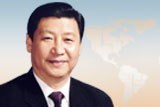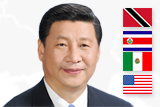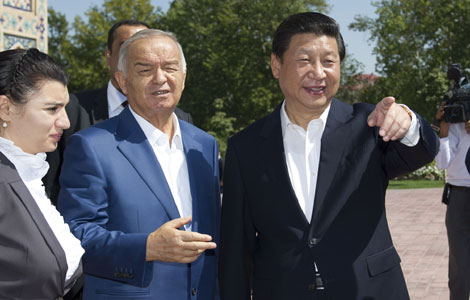
From rule-takers to rule-makers
Updated: 2013-09-05 07:45
By Huang Wei (China Daily)
|
|||||||||
G20 should pay more attention to the voices of developing countries and work together for fairer global governance
The G20 summit to be held on Thursday and Friday in the Russian city of St. Petersburg is expected to seek macroeconomic cooperation and coordination to give a boost to the nascent global economic recovery. The Group of 20 Finance Ministers and Central Bank Governors was created in 1999 as a forum for cooperation and consultation for the global economic architecture in the 21st century. With the onset of the global financial crisis in 2008, the G20 brought the group's leaders together for their first summit in Washington. Since then, the G20 has achieved concrete outcomes in responding to the global financial crisis, stabilizing financial markets and fostering steady, sustainable and balanced global growth.
China attaches great importance to the G20, a platform where it participates in global economic governance both as a founder and a key player. The country has even made participation in the G20 and other global economic governance mechanisms an integral part of its 12th Five-Year Plan (2011-15). During the fifth round of the China-US Strategic and Economic Dialogue in July, Beijing and Washington agreed to strengthen macroeconomic policy coordination under multilateral frameworks including the G20.
There will also be an informal meeting of the leaders of the BRICS countries Brazil, Russia, India, China and South Africa prior to the G20 summit and the five leaders will exchange views and coordinate positions on major international issues. This will help improve the efficiency of the summit in St. Petersburg.
As an emerging economy, China strives to facilitate South-South cooperation and urges the G20 to pay more attention to the interests of the developing world. In the context of South-South cooperation, at the sixth G20 summit in 2011 in Cannes, France, China announced it would grant zero-tariff treatment to 97 percent of the tariff items exported to China from the least developed countries that have diplomatic ties with China.
Over the past few years, China has made its voice heard in international governing bodies and substantially exercised its influence in building international institutions by making good use of the G20 platform. For instance, China has actively participated in G20 working groups, which, to a large extent, set the tone for multilateral economic cooperation in the future. For instance, earlier this year, Beijing joined the first Framework Working Group meeting in New Delhi and the first Energy Sustainability Working Group meeting in Moscow.
Also through the G20 platform, China has participated in a wide range of international financial bodies, such as the Basel Committee on Banking Supervision and the Financial Stability Board, and through membership quota reform, funding and other means, China is gaining more clout in major international bodies. Moreover, based on the G20 platform, China is steadily pushing ahead with the campaign against trade protectionism and is setting the direction for global governance. At the Los Cabos summit in Mexico last year, for instance, China worked closely with Indonesia and India and other countries to promote cooperation that will boost infrastructure investment.
Of course, China has also met challenges when participating in global governance. The advanced economies are keen to dominate the talks, focus on their domestic issues that weaken their positions as G20 members, and ignore the appeals of emerging economies. They are in a dilemma concerning China's rise. On one hand, they hope China can shoulder more international responsibilities, but on the other hand, they are unhappy with the shift that is tipping the global balance of power toward emerging markets such as China.
As for developing economies, the substantial differences and lack of experience in cooperation inflate the costs of their cooperation and coordination. Besides, the differences in culture and ways of thinking often increase the difficulty for China and other countries to reach common ground in the process of making rules and building institutions.
From a rule-taker to a rule-maker, China has gained growing clout in global economic governance, but it faces new challenges. China has participated in global economic governance for only a short period and will need to make more adjustments to better play its role in global governance. But with rational and practical approaches, China's leaders are capable of guiding the G20 toward fairer long-term economic governance while taking good care of short-term economic issues.
The author is deputy head of the Department of Global Governance, Institute of World Economics and Politics, Chinese Academy of Social Sciences.
(China Daily 09/05/2013 page8)
Related Stories
Xi arrives in St Petersburg for G20 summit 2013-09-04 22:45
G20 offers platform for China, France to discuss global issues 2013-09-04 20:46
G20 summit needs crisis-prevention mode 2013-09-04 13:24
G20 leaders to seek cure for ailing world economy 2013-09-04 13:19
Schedule









